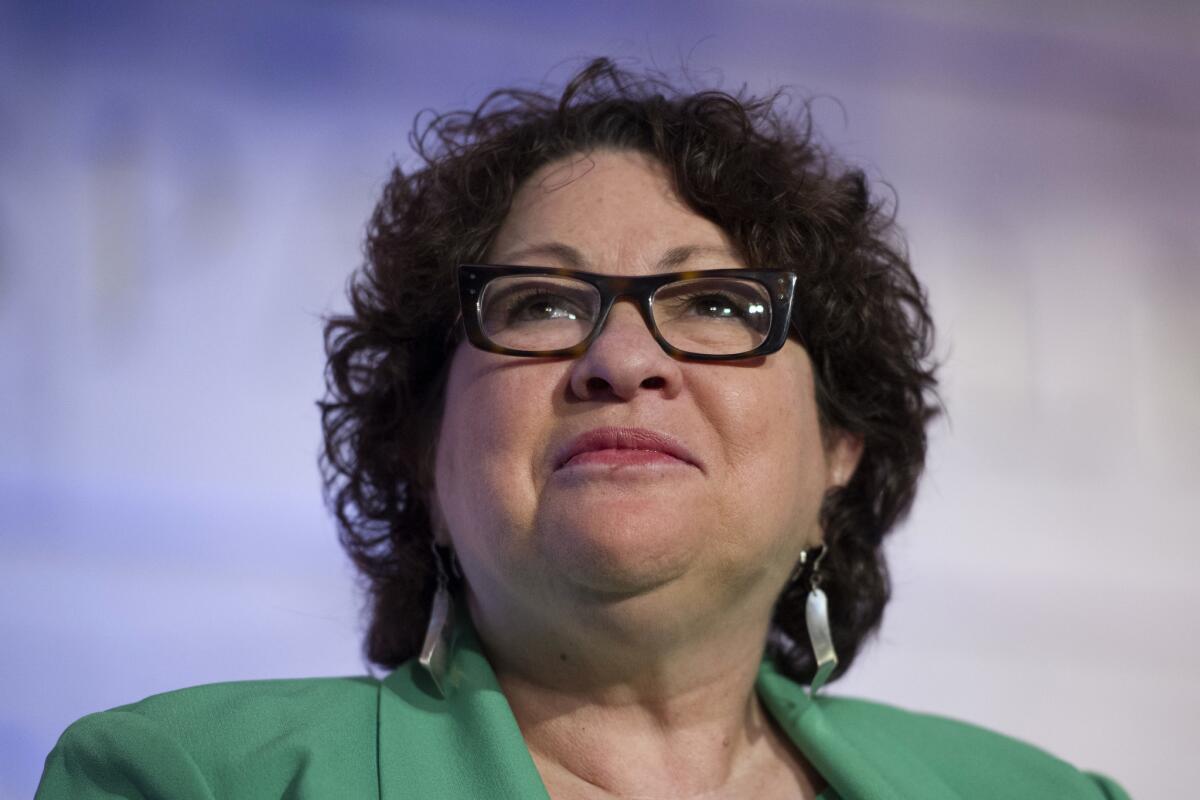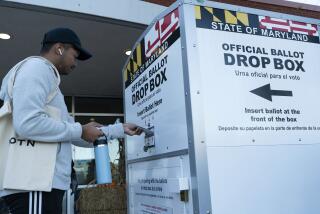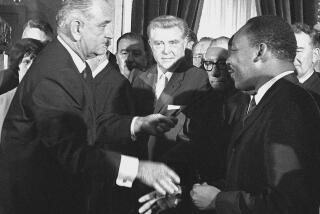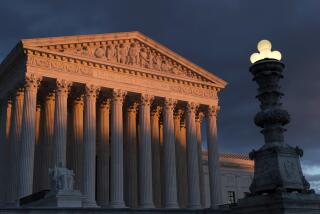Opinion: If the Supreme Court is going to make voting harder, it must explain why

During Senate confirmation hearings for Amy Coney Barrett, Democrats argued that, if confirmed to the Supreme Court, she should recuse herself from cases related to the presidential election.
The issue of Barrett’s participation became more important late Friday when Republicans in Pennsylvania asked the court to take another look at a decision by Pennsylvania’s Supreme Court allowing election officials to count mail ballots that arrive up to three days after Election Day.
Last Monday, by a 4-4 vote, the justices refused to disturb that ruling, with Chief Justice John G. Roberts Jr., a George W. Bush appointee, joining the court’s three remaining Democratic appointees. But the expected addition to the court of Barrett could give the Republicans the chance of a favorable ruling.
The Democrats were right. Barrett should recuse herself from this and other election-related cases, given President Trump’s comments about needing a ninth justice to resolve a potential disputed election. But even if she does so, the court will face a credibility crisis if it makes it harder for Americans to vote during the coronavirus pandemic but doesn’t explain why.
In voting not to disturb the Pennsylvania Supreme Court’s decision, the two groups of justices didn’t provide explanations for their respective votes. That’s not unusual. It’s common for the court not to issue opinions in the emergency appeals that constitute its so-called “shadow docket.”
Two days later, by a 5-3 vote, the court blocked a ruling by a federal judge holding that counties in Alabama could offer curbside voting to make it easier for disabled people to cast their ballots. All five justices appointed by Republicans were in the majority, and the justices appointed by Democratic presidents were in the minority.
The justices in the majority didn’t explain their action. But the dissenters did have their say.
In an opinion joined by fellow Democratic appointees Stephen Breyer and Elena Kagan, Justice Sonia Sotomayor offered a powerful argument for making curbside voting available, noting that the Centers for Disease Control and Prevention had recommended that states consider that option. She called a federal district court’s ruling, which was based on the Americans With Disabilities Act, a “reasonable accommodation” during the pandemic.
Sotomayor ended her opinion with a poignant reference to plaintiff Howard Porter Jr., a Black man in his 70s with asthma and Parkinson’s disease who told the district court: “[S]o many of my [ancestors] even died to vote. And while I don’t mind dying to vote, I think we’re past that — we’re past that time.’”
Sotomayor, joined by Kagan and the late Justice Ruth Bader Ginsburg, also wrote a dissenting opinion in July, when the court refused to revive a district court ruling that would have made it easier for former inmates convicted of felonies to vote in Florida’s primary election. There were no opinions from justices on the other side.
Justices who would make voting harder haven’t been as vocal, though earlier this month Justice Brett Kavanaugh wrote a brief opinion explaining why he agreed with the court’s action reinstating South Carolina’s requirement for witness signatures for absentee ballots.
Sotomayor and the other liberal justices seem to be operating on the assumption that the court should err on the side of making it easier for people to vote, especially during a health emergency. That’s a defensible approach, but it doesn’t follow that the conservative justices who voted the other way are antidemocratic or trying to throw the election to Trump. Nevertheless, their silence in the Alabama case encouraged such speculation.
Richard L. Hasen, an election-law expert at UC Irvine school, wrote on his Election Law Blog that “the conservative justices believe that it is up to states, rather than federal courts, to decide how to best balance health concerns related to voting during the pandemic with burdens on voting rights.”
Hasen added that the conservative justices also have adopted a strong view of the so-called Purcell Principle enunciated in a 2006 election decision that warns against changes in voting rules by courts close to the election. (Kavanaugh cited that principle in his opinion in the South Carolina case.)
Finally, Hasen saw a common denominator in Roberts’ differing votes in the Pennsylvania and Alabama cases: In both matters he was deferring to states or state courts.
Hasen may be right, but it would have been helpful if the justices in the majority in the Alabama case had spelled out their legal reasoning rather than leaving it for academics or journalists to figure out.
The pandemic has changed much about American life — including the way the court hears oral arguments. It also calls for more transparency about how cases on the “shadow docket” are handled. Every action by the court that makes it harder to vote should come with a full explanation.
The justices may be seeing the light about the need for transparency. Late Monday, a few hours after this post was published, the Supreme Court issued an order blocking a federal district court’s ruling that mail ballots in Wisconsin would count if they were received by Nov. 9 so long as they were postmarked by Nov. 3. State election law says that absentee ballots must be received by the time polls close on election day.
In this case, three justices who agreed with the outcome did explain their reasoning: Chief Justice John G. Roberts Jr. wrote an opinion explaining that, as was not the case in a similar Pennsylvania case, here it was a federal court that changed the rules. Justice Neil Gorsuch, joined by Brett Kavanaugh, wrote a separate opinion justifying the court’s action, and Kavanaugh wrote another opinion just for himself.
Justice Elena Kagan, joined by Justices Stephen Breyer and Sonia Sotomayor, filed a dissenting opinion.
More to Read
A cure for the common opinion
Get thought-provoking perspectives with our weekly newsletter.
You may occasionally receive promotional content from the Los Angeles Times.







